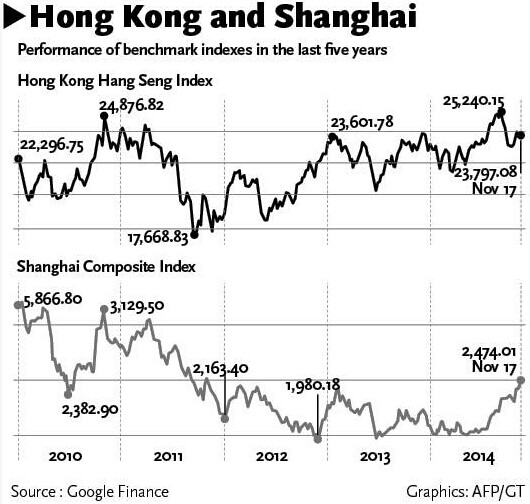

Hong Kong, overseas investors' enthusiasm outpaces mainland's
A landmark trading scheme linking the Hong Kong and Shanghai bourses debuted Monday, giving Hong Kong and overseas investors direct access to shares on the Chinese mainland.
The scheme brings China closer to opening up its capital market and to boosting globalization of the yuan.
The Shanghai-Hong Kong Stock Connect program will improve the competitiveness of Hong Kong as an international financial hub. It will push forward the opening up of mainland capital markets and boost the global use of the yuan, Leung Chun-ying, Hong Kong's chief executive, said at the launch in Hong Kong.
The program is a major innovation for China's financial system and a new model for facilitating cross-border securities investment with risk control, Xiao Gang, chairman of the China Securities Regulatory Commission, said in Shanghai.
It took more than seven months for the link to kick off since its official endorsement in April, and the benchmark Shanghai Composite Index has rallied over 18 percent since then.
The stock connect scheme will create the world's second-largest stock market by value, after the New York Stock Exchange, Goldman Sachs said in a research note released in September.
Investors had already hit the ceiling on the daily quota of 13 billion yuan ($2.1 billion) for northbound trading in Shanghai shares by 1:57 pm Monday, underlining the desire Hong Kong and international investors have for mainland A shares.
The fund inflow does not mean that A shares will experience a long-lasting bull market, and volatility is inevitable, Chen Xingdong, managing director and chief China economist at BNP Paribas Corporate and Investment Banking, told the Global Times Monday.
Authorities announced Friday a temporary halt to taxes on capital gains from the scheme, and the daily 20,000 yuan conversion limit for Hong Kong residents was lifted Monday.
"Overseas institutional investors are eager to enter the A-share market because many blue chip stocks in the mainland are undervalued compared with the Hong Kong bourse," said a fund manager surnamed Yu at Ningbo-based Hunting Wealth.
Hong Kong and overseas investors previously traded in mainland shares primarily through the Qualified Foreign Institutional Investor program, while mainland investors have proven hesitant to invest in overseas stocks through the Qualified Domestic Institutional Investor scheme.
Yet on Monday alone, 1,800 stock connect accounts were opened by mainland investors, a source at China Galaxy Securities, one of the country's major securities brokerage firms, said on condition of anonymity.
Despite the surge in account openings, trading in H shares was lukewarm, with only 16.8 percent of the 10.5-billion yuan southbound quota used up Monday. Analysts put the disparity down to mainland investors preferring to trade cheap small cap shares rather than blue chip stocks with less volatility.
Under the connect scheme, investors are allowed to buy and sell 568 Shanghai-listed shares and 268 Hong Kong-listed shares, the majority of which are large cap shares.
The benchmark Shanghai Composite Index ended at 2,474.01 points Monday, down 0.19 percent from the previous trading day, while the Hong Kong Hang Seng Index was 23,797.08 points at market close, down 1.21 percent.
The key is not the short-term rise or fall of the stock index, but the scheme's ability to accelerate the opening of China's capital markets, said Gui Haoming, research director of Shenyin & Wanguo Securities Co Ltd.
Dong Dengxin, director of Finance and Securities Institute at the Wuhan University of Science and Technology, said Monday that a further opening-up of China's capital market is expected, yet it will be based on the country's progress in lifting capital controls.
It is only a matter of time before the Shenzhen Stock Exchange is also linked up with Hong Kong, Reuters reported.
Offshore yuan deposits will continue to grow at a robust pace, and will reach an estimated 2.5 trillion yuan by end of 2014, said Liu Li'nan, a strategist with Deutsche Bank.
HK stocks down 1.21% after Shanghai-HK Stock Connect launch
2014-11-17Shanghai stock indices close mixed on Monday
2014-11-17Key Hang Seng index down after launch of Shanghai-HK Stock Connect
2014-11-17Hong Kong, Shanghai open stock exchange link
2014-11-17China stocks rise with Shanghai-HK stock connect launch
2014-11-17China launches landmark Shanghai-HK stock link program
2014-11-17Copyright ©1999-2018
Chinanews.com. All rights reserved.
Reproduction in whole or in part without permission is prohibited.